1901 feels a lot like 2020 in Orhan Pamuk’s latest novel
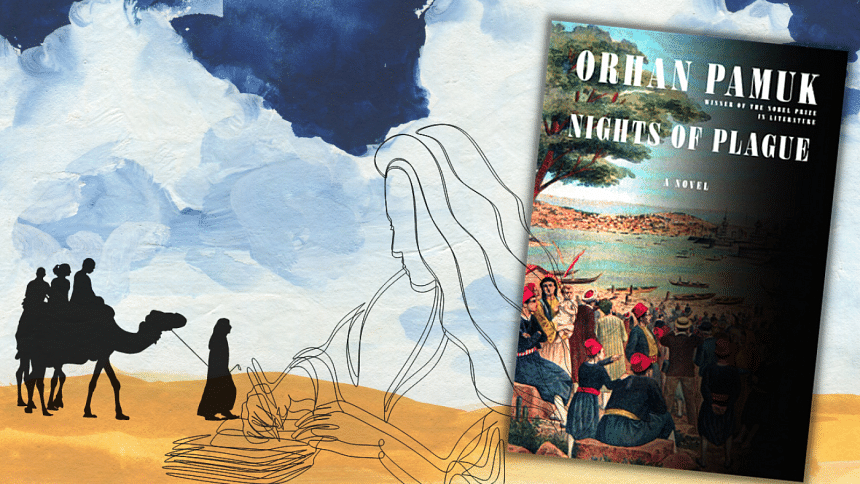
There is a woman who writes letters. She sits at her desk overlooking the Mediterranean Sea, day after day, and fills pages to send to her sister in Istanbul. Almost a century later, another woman would derive heavily from their correspondence to write the history of Mingheria and hand it down to us in the form of the book named Nights of Plague (Knopf, 2022).
The letter writing woman is Princess Pakize. She came to the Ottoman island of Mingheria with her husband, Prince Consort Doctor Nuri—a brilliant quarantine doctor—to put an end to the infectious bubonic plague that was creeping out of control yet was being kept secret by the authorities. The island, called the pearl of the Mediterranean Sea, has an almost mythical quality to it. Famous for its pink-white marbles and fragrant rose biscuits, Mingheria is the birthplace of a contemporary historian, Mina Mingher, whose voice the writer chooses to tell the story in.
Our historian does a rigorous job of "verifying the authenticity" of the Mingherian history she learns. Her primary source, and inspiration, are the letters of Princess Pakize, and to confirm different historical details, she refers to memoirs of those who survived the time. Perhaps because of all the cross-referencing and promises of accuracy, it took me a hundred pages and a google search of 'Mingheria' to realise that all of it—Mingheria, Princess Pakize, and Mina Mingher herself—are fictional.
Nights of Plague, like Orhan Pamuk's prize-winning novel My Name is Red (Knopf, 2001), is a historical fiction with a murder mystery. But as one historical event unfolds after another, with Princess Pakize and her husband constantly evoking for me a sense of Sherlock Holmes while trying to solve the murder, the book's pages darken with a shadow of Westernisation at the dusk of the Ottoman Empire.
Opposed to most of the Empire, where Westernisation took a firm footing, Pamuk shows Mingheria as the boiling pot of nationalism. As the plague covers the capital Arkaz like an ominous blanket, places where flowers used to grow start reeking of death. With no scheduled ferries visiting the island anymore, the sea turns into steel, making it clear that Mingheria is left on its own. Such extreme ordeal breeds the ground for very subjective, seemingly inconsequential, but history-altering actions by individuals who change Mingheria forever.
With the island completely cut off, pictures sent by correspondents to foreign newspapers remained the only source that allowed the world to know what was happening in Mingheria. The author, in a solemn but satirical tone, shows how these pictures were misinterpreted by newspapers—either due to lack of knowledge, or to create a more interesting narrative, or both. Reading about this brings a sense of deja vu of our own struggle with fake news during the Covid-19 pandemic.
How Mingherians responded to the infectious plague in 1901 isn't altogether different from our response to the Covid-19. They too hid their patients in fear of stigma and isolation, selfishly hoarded commodities, and used the disease as a political and religious weapon. The first edition of the novel (in Turkish) came out in October 2021 and Pamuk started writing it just four years before the pandemic broke out, which lends to him an almost clairvoyant quality.
But clairvoyant or not, he definitely was a painter, as he wrote in his memoir, Istanbul: Memories and the City (Knopf, 2005). 'Painting with words' takes a literal meaning in this novel. Historical landmarks are captured in paintings that Pamuk describes, taking note of the little details of the background, rendering the mood in their subtle and dominant hues, and creating vicarious visual pleasure for the readers.
After Mina Mingher has told us the story of Mingheria, she walks us through her tiresome experience of writing this book. She is denied renewal of her Mingherian passport for 20 years. The authorities relent at some point, but her possessions would be searched in her absence and the secret police would monitor her every move. It's the story of many intellectuals who have tried to tell a history without being blind to the Empire's injustice against its Greek, Armenian, and Kurdish populations. Many writers, including Orhan Pamuk and Elif Shafak, have suffered because Turkey still holds on to this collective amnesia.
Be it lack of intellectual freedom or the outbreak of a disease, Pamuk constantly evokes the present through the past in this book. Plague has crept through the map of history, cloaking cities in death and desolation. But it didn't stop at destruction. In Mingheria, the plague was as much about creation as it was about death.
Noushin Nuri is studying business in school and literature at home. Reach her at [email protected].

 For all latest news, follow The Daily Star's Google News channel.
For all latest news, follow The Daily Star's Google News channel. 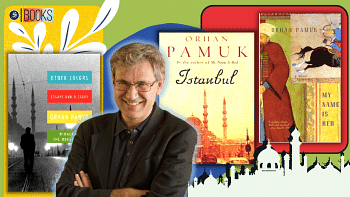
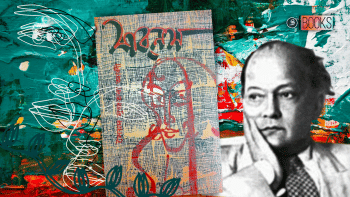





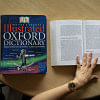
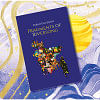



Comments